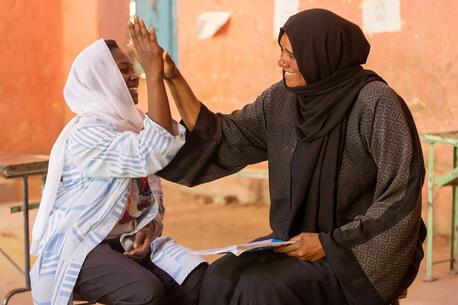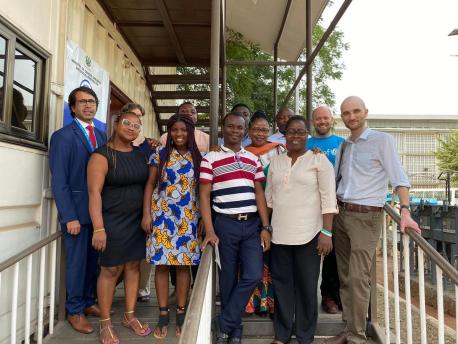
UNICEF & Microsoft Leverage Tech to Protect Vulnerable Children
UNICEF teamed up with Microsoft to launch a new cloud-based version of Primero, a revolutionary digital case management tool that helps social workers coordinate care for children at risk.
Primero, an open source digital case management tool created by UNICEF and delivered by Microsoft, is revolutionizing the way social workers work with their young clients and connect them with the services they need.
"We're focusing on children in a high state of vulnerability," says UNICEF Child Protection Specialist and Primero Project Lead Robert MacTavish. "One such group is unaccompanied and separated children. Young people can be very vulnerable when they are on their own."
Whether they have become separated from their family during an emergency, set off on their own in search of job opportunities or simply run away from home, children without a family unit are at risk. They "could be trafficked, or they could be children who have survived abuse or violence. They may have mental health issues. It makes them a challenging population to reach," MacTavish says.
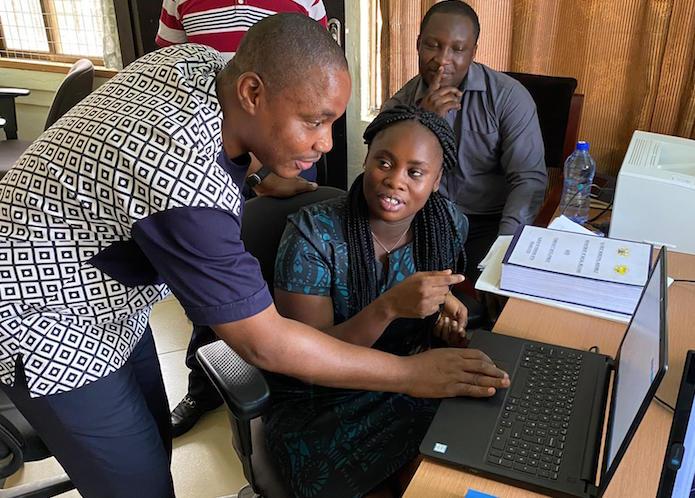
To reunite a missing child with their family, social work supervisor Kingsley Agordo (far left, with colleagues in Ghana's Greater Accra Region) used the latest version of Primero, an open source case management tool from UNICEF and partners. © UNICEF/MacTavish
Social workers have used Primero to reach more than 100,000 vulnerable children in 32 countries
UNICEF began developing Primero in 2014 in partnership with the software company Quoin, with an initial roll-out in 2015. Since then, Primero has helped social workers reach more than 100,000 vulnerable children in 32 countries. After a devastating earthquake and tsunami hit the island of Sulawesi in September 2018, for example, Primero helped UNICEF Indonesia and the Social Ministry of Palu provide services for children and reunite missing children with their families.
Several challenges limited Primero's widespread use, however. Working with the development team from Quoin, UNICEF originally built Primero as both a mobile application and a web app. “We had to do everything twice,” which drained IT resources, explains Pavel Nabutovsky, a technology for development lead who heads the Primero project for Quoin. “It was difficult to scale at any level.”
For each new location, an expert needed to travel to set up Primero on-site, a requirement that was costly, time-intensive and difficult in terms of security. This slowed down rapid deployment, a frustrating delay in fast-changing natural disasters or the mass displacement of populations due to armed conflicts. And when IT staff wanted to make an improvement to the platform, they had to fix each of the 40 iterations in use.
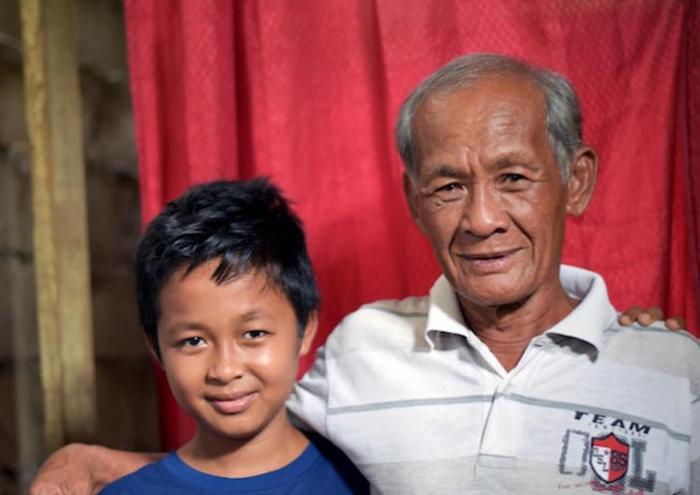
After a devastating earthquake and tsunami hit the island of Sulawesi in September 2018, Pak Bakir (right) searched for his 13-year-old son, Rivaldi, for three days, not knowing if he was alive or dead. Social workers supported by UNICEF Indonesia used Primero, an online data management platform, to reunite the two. © UNICEF/UN0292618/Donnell
The new cloud-based Primero X is being piloted in Ghana, with expected releases in dozens of countries by 2022
Now UNICEF, Microsoft and Quoin have addressed all those obstacles with Primero X, streamlining the Microsoft Azure-based platform as a progressive web application and software as a service (SaaS). As a result, staff on the ground are poised to serve even more.
“This digital tool is going to revolutionize case management,” says Cornelius Williams, UNICEF Associate Director and Chief of Child Protection. He explains that the tool will:
- allow governmental agencies and other partners to focus time and funding on services instead of IT
- deploy more quickly in humanitarian crises
- improve the quality and consistency of care to vulnerable groups
- protect the privacy of at-risk children
The new cloud-based Primero X is currently being piloted in Ghana, with expected releases in dozens of countries through 2022. UNICEF aims to have Primero live in 60 countries and territories by 2025. “The partnership between UNICEF and Microsoft will help strengthen the Primero platform and scale it up to benefit millions of vulnerable children and young people, both now and in the future,” says Williams.
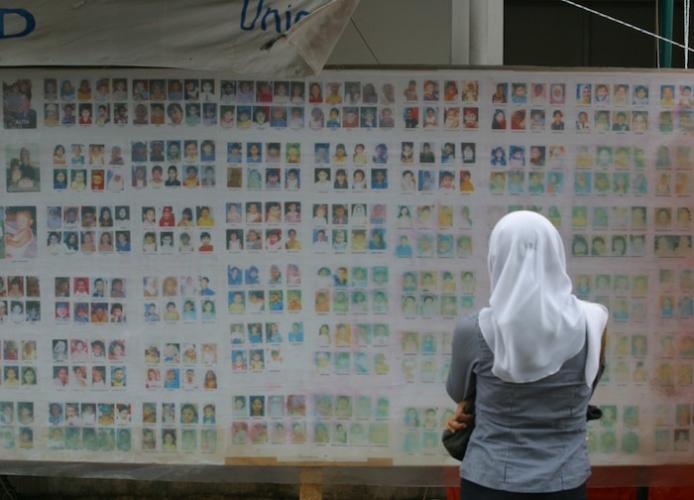
In Indonesia in 2005, a woman searches for her missing child on a board showing photos of children who have become separated from their families. Making photos of missing children public is "extremely risky," says UNICEF Child Protection Specialist and Primero Project Lead Robert MacTavish. "There's a lot of evidence and documented cases of traffickers [using photo displays] as a catalog of children they can target." The Primero platform allows child protection actors — ministry employees, faith-based organizations, community leaders, boys' and girls' groups — to share information safely. © UNICEF/UNI42164/Estey
Child protection workers can access Primero X on a mobile device or a computer
In 2018, UNICEF and Microsoft launched a global partnership to pool and complement one another’s expertise, resources, leadership and advocacy to help displaced and vulnerable children and young people.
When UNICEF completed an analysis of multipurpose cloud providers for the development of the new Primero, Azure was the right fit. Flexible hosting, security through Azure Active Directory, and the cost savings made Azure “a compelling technical and financial choice,” says Sebastian Bania, Primero platform lead for UNICEF.
Additionally, UNICEF was committed to developing an open-source tool so others could build on or adapt the solution to meet their needs, and Azure supported the technologies and standards common throughout the industry. The result: an intuitive platform that meets a critical demand in the field.
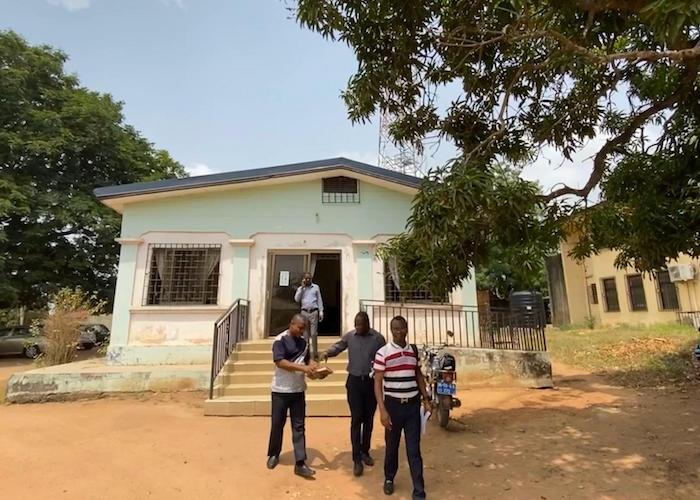
In Ghana's Ga West Municipality, social workers once relied entirely on paper-based ledgers and registers. UNICEF's Primero digital platform will help them better manage sensitive child welfare data. © UNICEF/MacTavish
Cutting down on paperwork leaves more time for building trust with children
Williams calls social workers and case managers “heroes, frontline workers and defenders” who work tirelessly to provide children and young people access to lifesaving services and protection. Technology is enabling that calling. “Digitizing case management drastically reduces the procedural work, like filling out forms and then moving those files from one location to another,” Williams continues.
The beauty of a well-designed digital case management tool is that social workers don’t need a background in technology to use it. The back-end architecture of Primero X is largely invisible to the average user and constructed to create a secure, accessible way to document case progress. The new Primero X, which is built in Azure Block Storage orchestrated with the open-source container management application Kubernetes, replaces analog systems common among social service agencies around the world.
“This brings down the number of hours spent on paperwork on every case,” Williams says.
Social workers can use Primero — both the progressive web app and the SaaS — on a mobile device in the field. This immediately reduces the time it takes to get a new case registered and connect children to needed supports.
The tool takes users through a flow to populate required fields and assess the level of risk a child faces, which helps managers triage cases. The tool also repopulates information across forms in each case entry so social workers don’t have to re-enter the same details, such as names and birth dates.
With as many cases as a typical social worker handles, these efficiencies translate to a lot of time freed up to focus on the needs of at-risk children. Increasing face time with clients helps social workers earn the trust of those who have experienced violence, abuse or neglect, such as a survivor of gender-based violence. “Building trust is cardinal," says Williams. "It shows clients that our mission is to protect them.”
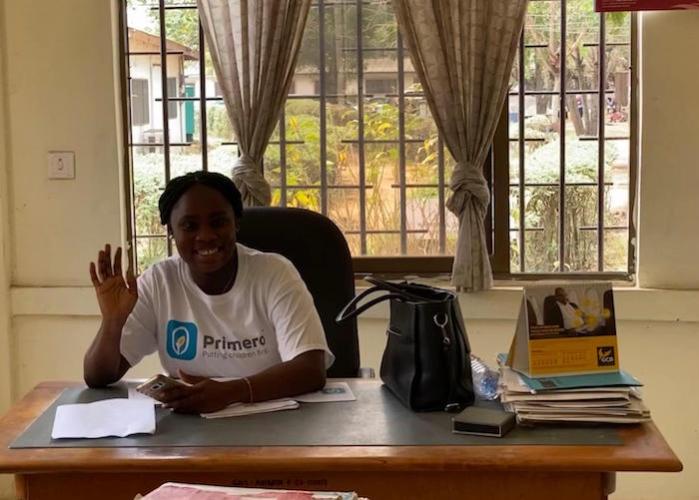
A social worker in Ghana's Ga West Municipality, where UNICEF's Primero online data management tool is revolutionizing child protection work. "This is a really passionate vocational work force," says UNICEF's Robert MacTavish. "They get no recognition, they are overworked and they have tons of paperwork. We want to make a tool that is specifically for them, so they have more time to dedicate to their clients." © UNICEF/MacTavish
Finely tuned permissions control access and protect a child's right to privacy
The security and protection of a child’s right to privacy within the case management tool builds confidence among clients and case workers alike.
"In Ghana, you see social workers using these big paper ledgers and books and forms. Confidentiality is really hard to enforce without a digital system," says MacTavish. "It's paper everywhere, so data privacy is a challenge. There's the risk of that information being misplaced. In the wrong hands, it could be used to discriminate against the child or to target them. But most importantly, the biggest risk is that the process is so intrusive to the child that they don't access the service. Kids just don't do it, especially adolescents."
The Primero platform has finely tuned permissions access, which provides “very conditional, limited, need-to-know access to data and data sharing,” says Nabutovsky. Users know data is kept confidential, leading to widespread adoption of the tool. The most recent version also includes tighter standards inspired by the General Data Protection Regulation (GDPR), the European Union law that has since become the global standard for data privacy.
“Security is a big deal for UNICEF and our partners,” says Bania. “We share the responsibility of managing that with Microsoft, which eases some of our resource commitment. Microsoft keeps everything secure and patched.”
Advanced Azure security services give UNICEF IT staff peace of mind. Tools such as Azure Sentinel enable UNICEF to detect and react to threats before they cause harm.
UNICEF also worked with Microsoft to ensure case workers can secure and lock down a mobile device, whether they’re using Primero on a computer or handheld device. This gives them the freedom to be truly mobile, carrying relevant case files with them whether working from home or in the community. This has proven extremely valuable as social workers adapt to social distancing and other efforts to contain COVID-19.
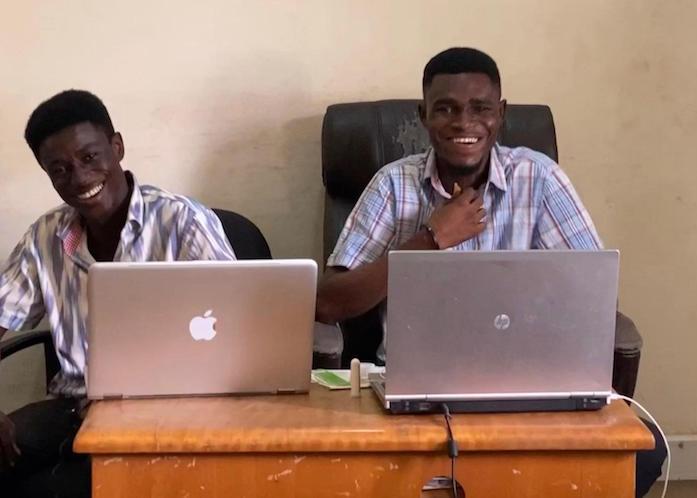
Child protection case workers typically carry bulky folders containing their clients' birth certificate, medical records and school attendance reports. "Essentially, what we're doing is digitizing that," says UNICEF's Robert MacTavish. "We're making it so they can have all that on a phone or on a tablet and print things if they need them or upload things to the record so they're safe." © UNICEF/MacTavish
Improving quality and consistency of care can be a matter of life or death
There is a lot at stake for getting social work right, Williams says. “Effective case management helps prevent additional trauma and harm, and it supports front-line workers to reunite families. It can be a matter of life or death.”
Primero helps improve the quality of care by reducing errors, which can place barriers between clients and the care they need. For example, a busy social worker may accidentally mis-enter a client’s age but correctly input their birthday. On a paper form, that mistake would live on in the record; thanks to the automatic checks of the Azure-based tool, that issue would be flagged for correction, saving managers countless hours of reviewing and correcting case files.
New hires learn the ropes more quickly because they simply follow the tool’s flows, which are customized to local needs. Built-in checkpoints won’t allow workers to forget or skip required fields, which improves consistency in the records.
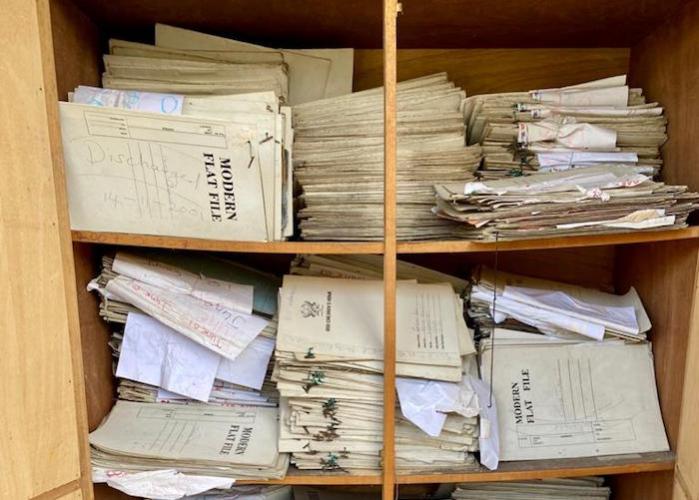
Life before Primero: Child protection workers in Ghana's Ga West Municipality kept all their records on paper before implementing UNICEF's Primero digital case management platform. © UNICEF/Deliege
Making sure a child's needs aren't lost in a pile of files
Kingsley Agordo, a social worker in the Ghana's Greater Accra Region, points out that he and his colleagues often juggle many cases, and “the reminders in Primero help us manage that workload.” The updated tool alerts them to needed follow-up based on past actions, like checking in on a child living in family-based care. The time between actions is standardized so case workers consistently keep up with necessary steps — ensuring that a child’s needs aren’t lost in a pile of files.
“This digital trail makes case management auditable and puts our field on a path of continuous improvement,” adds Williams, so leadership can spot issues — and course-correct when needed. If case workers are missing follow-ups, for example, managers can retrain workers. The concrete data also helps agencies advocate for additional funds or staff to further support the protection of children and young people.
Raising standards of care worldwide
Nabutovsky calls Primero a “digital public good” not only because it’s an open-source tool but also because it advances best practices for child protection services and other social work. “Primero gives UNICEF the chance to disseminate the most effective approaches to delivering child protection programming,” he says.
While improved data collection serves as an essential component of successful programming, such data-driven approaches require the collection, transmission, storage, and sharing of personal information. Mitigating the mishandling of data and promoting a culture of responsible data practice is imperative to protect children. To this end, UNICEF and partners launched the Responsible Data for Children (RD4C) initiative to strengthen data privacy and promote best practice in data responsibility.
“We at UNICEF have a vast array of knowledge and experience protecting children’s rights,” says Bania. “Primero allows us to encode part of that know-how into software.”
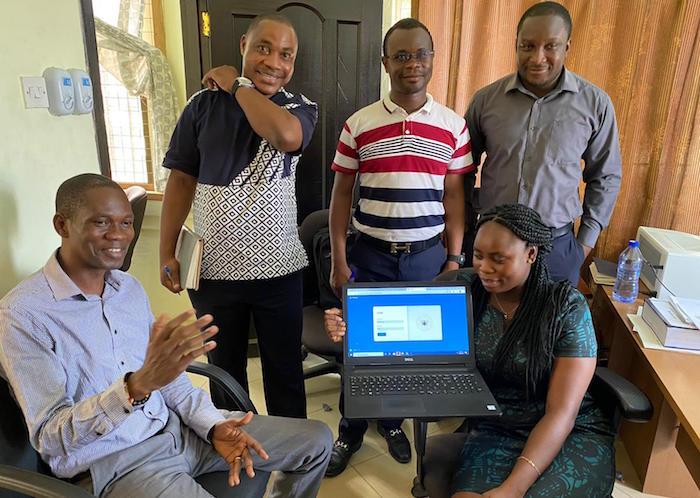
The Primero platform can be tailored to suit the needs of each country. In Ghana, for example, many people share the same names. "We went around the room and there are four Kofis and three Kingsleys," says UNICEF's Robert MacTavish. "So we have to refine the probability of searches so we aren't dependent on names alone, because that's not going to work." © UNICEF/MacTavish
When an emergency hits, a custom version of Primero can be deployed in as little as 20 minutes
Armed conflict, natural disasters, and other emergencies expose millions of children and young people to violence, exploitation, abuse and neglect. Unfortunately, such humanitarian crises are unlikely to end anytime soon and will continue to create conditions where children need help. Fast.
With the new web app, IT staff can configure a custom version for less cost and deploy it in as little as 20 minutes — compared to the two to three weeks it took in the past.
One factor in this lightning-fast deployment: “Relying on Azure services rather than local organizations storing and maintaining their own instances,” Bania says. Running Primero as a SaaS shifts the work of making updates and maintaining security to the UNICEF/Quoin team rather than the resource-strapped governmental agencies and other partners using the platform.
Primero contains ready-made templates, such as for rapid onset emergencies or a public health crisis, calibrated with the input of organizations such as the Alliance for Child Protection in Humanitarian Action and the United Nations High Commissioner for Refugees. A single email to the UNICEF team can request a new instance as well as modifications to a template, such as local languages. “We baked templating into Primero so you don’t have to start from scratch every time,” Nabutovsky says. The hours saved could translate into lives saved on the ground.
Upkeep is now easier, too. Instead of making an update or change to every one of the deployed instances, as they had to before, staff can make a single change to the centralized platform. Localized instances then automatically upgrade, freeing the IT team to focus on bigger picture projects that advance the organization’s mission to work for the rights of every child, every day, across the globe.
“As we increase the number of countries using the upgraded Primero, more children will be served,” says Williams. “The scale of impact is revolutionary. This is a matter of social justice.”
Your generous donation will support UNICEF's work with partners to protect children from violence, exploitation and abuse. Please donate.
With reporting by the Microsoft Tech for Social Impact Team
Top photo: The Primero technical team with UNICEF Ghana child protection team and Ministry of Gender, Children and Social Protection team outside the UNICEF office in Accra, Ghana, where a new version of Primero, a scalable case management tool built by UNICEF and delivered by Microsoft, is being piloted. Far right: UNICEF's Robert MacTavish (in blue shirt) and Quoin's Pavel Nabutovsky. © UNICEF/MacTavish
